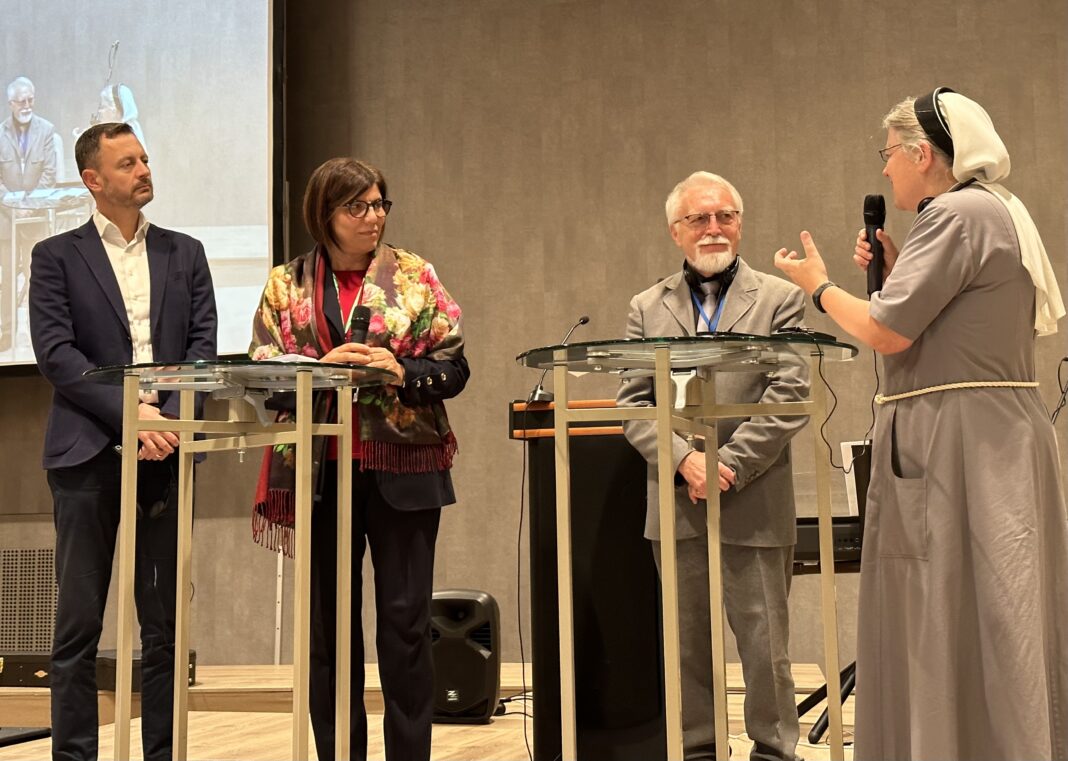By Martin Hoegger
One of the highlights of the Together for Europe meeting in Timişoara (Romania, 16-19 November 2023) was a workshop on peace. It gave the floor to witnesses from countries at war, such as Ukraine and the Holy Land. All of them have friends and family in these regions.
Knowing people personally from regions in conflict changes our perception. Do you have friends or relatives in these regions? If so, we can no longer talk about these conflicts in theoretical terms because people are involved. Another question: are you involved in a mutual aid project in conflict zones? Nicole Grochowina, from the Protestant community of Selbitz in Germany, asked participants to answer these questions at the beginning of the workshop.
Educating for peace and dialogue
Donatella, an Italian living in Ukraine who spent 24 years in Russia in a Focolare community, says: “This war is an open wound. There’s a lot of suffering all around me. The only answer I can find is to look at Jesus crucified. His cry gives me meaning; his pain is a passage. Then I understood that love is stronger than pain. That helps me not to withdraw into myself. So often, we feel powerless. All we can do is listen and offer a little hope and a smile. We need to create space within ourselves to listen deeply and bring the pain into our own hearts so that we can pray”.
Another participant in this round table was born in Moscow and lived there for 30 years. Her mother is Russian and her father Ukrainian. She has friends in both Russia and Ukraine. Nobody believed that such a war would be possible and that Kyiv would be bombed! She has made herself available to take in refugees. However, she is not comfortable with the rhetoric of those who reject all Russians. She suffers because she is torn between the two parties.
Margaret Karram, the president of the Focolare movement – an Israeli of Palestinian origin – says three very topical words for her: “fraternity, peace and unity”. The time has come to highlight our duties because it’s not enough to talk about a just peace, we must educate people for peace and dialogue.
Born in Haifa, where Jews and Palestinians live together, she studied in a Catholic environment with a Muslim presence. In Haifa, her neighbours were Jewish. Her faith enabled her to overcome discrimination.
Then she lived in Jerusalem, in a city where many divisions separate people. She was shocked by this and worked to bring them together. Later, she studied Judaism in the USA. Back home, she became involved in several interfaith initiatives, particularly for children. She discovered that so much is common to all three religions.
Philip McDonagh, Director of the European Union’s Centre for Religions and Values, points out that Article 17 of the EU Charter calls for dialogue to be stepped up. Regarding territorial claims, he is convinced that time is more important than space, and that the whole is greater than the sum of its parts.
The diplomacy of “theological virtues”
Sylvester Gaberscek is a former Secretary of State in Slovenia’s Ministry of Culture. A bridge builder between very different parties, he had relations with politicians from all sides. He discovered that it is possible to work together for the common good despite hatred. He practised what he calls “a diplomacy of faith, hope and love”.
Called to Kosovo and Serbia to provide training in dialogue, he discovered that “the only thing I had to do was listen and understand everyone. “People were transformed by it”.
Édouard Heger, former President and Prime Minister of Slovakia, wonders how to get out of one war and prevent the next. That is the central question. He believes that at the root of every war, there is always a lack of love and reconciliation.
The vocation of Christians is to be people of reconciliation. They must advise political leaders with a view to reconciliation. But reconciliation also depends on us, being courageous and speaking out with love. People want this message.
Bishop Christian Krause, former President of the Lutheran World Federation, notes that a friend can quickly turn into an enemy. Only love for Jesus can overcome this pain. Indeed, his beatitudes are a beacon of light. The two politicians above had the courage to follow Jesus by living them.
In East Germany, before the fall of the Wall, the Church was a place of freedom. A miracle from God took place. Yes, it is worth hoping in God and making it public. The doors of the Churches must remain open in these times of transformation. And for Christians to be artisans of reconciliation.
“We are a minority, but a creative one”, he says. Without a pact of mutual love, we cannot be sure that Jesus is in our midst. But if he is, he is the one who builds the house. And the miracle of reconciliation will be accomplished… in Europe and throughout the world!
Photo: From left to right, Edouard Heger, Margaret Karram, Sylvester Gaberscek and S. Nicole Grochowina









